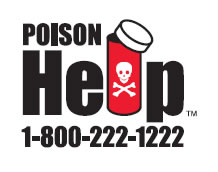POISON PREVENTION
The following information was obtained from the Poison Help website.
|
Poison Info
Poisons are all around us and can affect anyone, anywhere at any time of life. Protect yourself and others from being poisoned by learning what a poison is, who is at risk, and how to prevent a poisoning from happening. Visit the Frequently Asked Questions (FAQs) section to learn the answers to the most common questions about poisons. See What Can You Do? for more information, including tips on how to talk about poisons, poison proof your home, and raise awareness about the Poison Help line, 1-800-222-1222, which connects you to your local poison center. What is a Poison? A poison is anything that can harm someone if it is 1) used in the wrong way, 2) used by the wrong person, or 3) used in the wrong amount. Some poisons may be harmful if they come into direct contact with your eyes or skin. Others may be toxic if you breathe them or swallow them. Poisons can come in four forms: solids (such as pain medicine pills or tablets), liquids (such as household cleaners, including bleach), sprays (such as spray cleaners) and gases (such as carbon monoxide, or CO).(1) Most consumer products are safe if label directions are followed, but some can be poisonous if used incorrectly. Visit the Frequently Asked Questions (FAQ) section for a list of different poisons. If you think someone has been poisoned, call the toll-free Poison Help line right away, 1-800-222-1222, which connects you to your local poison center.
Who Is at Risk? You may think that poisoning affects only a certain group of people – such as young children or older adults. This, however, is not true. Anyone, regardless of their age, race, ethnicity, or career, can be poisoned. Poisonings happen more often than you think. In 2008, 2.5 million people called a poison center because someone had been exposed to a poison.(1) Children under age 6 accounted for half of all human poison exposures reported to poison centers.(2) However, adults are also at risk. That year, more than three-quarters of all poisoning deaths reported to poison centers occurred among people ages 20 to 59.3 What are the risks throughout life? Certain kinds of poisonings are common among specific age groups. For example, older adults specifically need to be aware of the poisoning risks involved with taking prescription medications. Children are commonly poisoned through painkillers, cosmetics, personal care or cleaning products, pest killers, and plants. Preteens through older adults are commonly poisoned through herbal products, prescription drugs, alcohol, over-the-counter medicines, and spoiled food. People of all ages may be stung by a bee, splashed with a chemical, or exposed to carbon monoxide in their homes. People also may use a cleaning product without gloves. For more information on how poisonings can affect everyone, download the Poison Help brochure (PDF - 6.96 MB). This brochure has four inserts with specific information for adults of all ages, health professionals, and parents. If you think someone has been poisoned, right away call the toll-free Poison Help line, 1-800-222-1222, which connects you to your local poison center.
|


